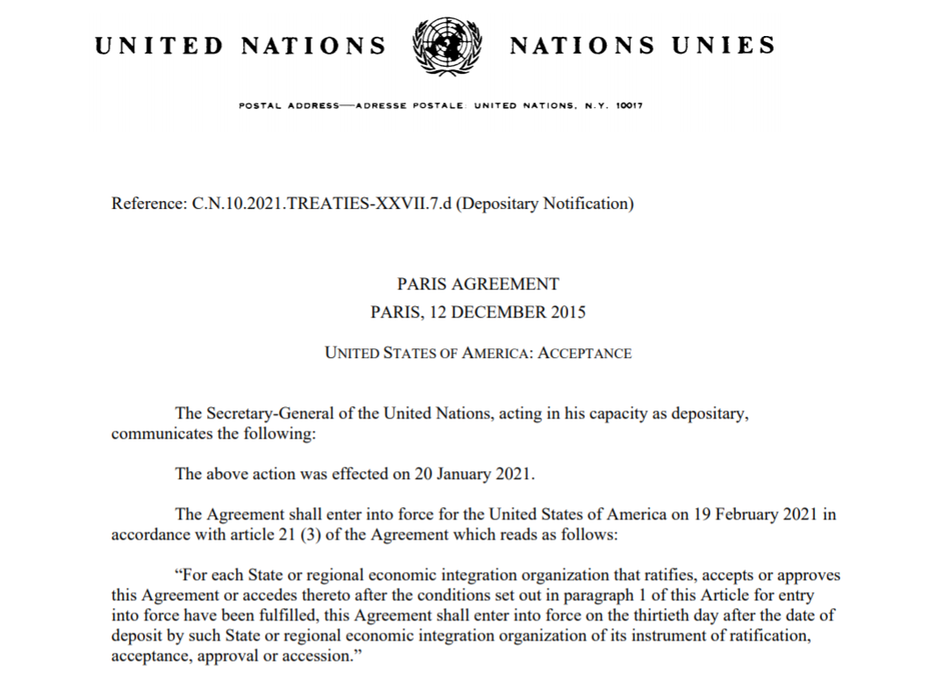The U.S. is no longer acting like an insolent child peeing in a swimming pool.
On Nov. 4, 2020, the Trump administration quit the Paris Agreement, becoming the only nation to leave the world’s most important effort to curb Earth’s relentless warming. Even the hyper-isolated dictatorship of North Korea was still aboard.
But before he was elected, newly-inaugurated President Joe Biden pledged to rejoin the treaty on “day one.” He did, signing an order in the Oval Office on Jan. 20. Crucially, later that same day the Secretary-General of the United Nations, António Guterres, accepted Biden’s request to return (and thereby help stabilize the disrupted climate).
Just like that, the U.S. is essentially back. (Wonky procedures mean this acceptance enters “into force” on Feb. 19.)

UN depositary accepting the U.S. back into the Paris Agreement.
We’re back in the Paris Climate Agreement.
— President Biden (@POTUS) January 21, 2021
Returning to the climate treaty greatly benefits global nations, the U.S., and, not least, every living thing.
-
The U.S. has emitted more heat-trapping carbon dioxide into the atmosphere than any other nation. It’s responsible, then, for a significant amount of Earth’s warming. Rejoining the treaty can influence or encourage other big carbon polluters to ambitiously slash emissions, too. “If we, the greatest historic polluter, are unwilling to take leadership, why should China?” asked Michael Mann, a climate scientist at Penn State University, when the Trump administration announced its intention to quit in 2019. “Why should India? It sends a horrific message to the rest of the world.”
-
The U.S. will directly benefit from stabilizing the world’s temperatures, perhaps at some 2 degrees Celsius (or 3.6 Fahrenheit) above temperatures in the 1800s. Already, the nation is experiencing the likes of a Southwestern megadrought, rising seas, and surging wildfires.
-
Stabilizing the climate is not about saving the planet. The planet, in the long run, will “survive.” Rather, curbing today’s warming is largely about avoiding severe impacts to human civilization. “The climate crisis is not an environmental crisis, it is a crisis of human society and the biosphere that sustains us,” Sarah Green, an environmental chemist at Michigan Technological University, told Mashable in 2019.
A primary aim of the Paris Agreement is to encourage global nations to ramp up their climate ambition, meaning how much they’ll reduce their greenhouse gas emissions in the coming decades and beyond. Right now, with relatively small efforts to curb emissions, the world is on track to warm by some 3 degrees Celsius, or some 5.4 degrees Fahrenheit, above pre-Industrial Revolution temperatures by the century’s end.
This would be bad.
“A 3C world will have catastrophic impacts for some, the loss of islands, corals, Arctic sea ice, some land glaciers, and not to mention changes in extreme weather,” Glen Peters, the research director at the Center for International Climate and Environmental Research (CICERO) previously told Mashable.
The good news is humanity can potentially curb warming at a more moderate 2C, or perhaps somewhere near there.
“We’re already experiencing the dangerous effects of climate change,” Bob Kopp, a climate scientist and director of the Institute of Earth, Ocean, and Atmospheric Sciences at Rutgers University, told Mashable last year.
“Every bit we emit causes more damage,” he said. “The sooner we stop emitting, the less damage we’ll cause.”
